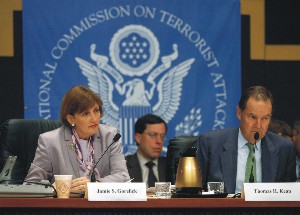Special Commission Says
American air defences 'unprepared' for 9/11
Reuters, Washington
US fighter jets had virtually no chance to shoot down or intercept four hijacked planes on Sept 11, 2001, because of confusion and poor communication among "unprepared" officials responsible for America's air defences, a special commission said Thursday. The confusion was shared by Vice President Dick Cheney, who wrongly believed at one point that the military had downed "a couple" of aircraft under orders he conveyed, the panel said. In a report that included chilling quotes from hijackers commandeering the doomed aircraft, the commission's staff found a White House order to shoot down hijacked planes did not reach Air Force jets until after the last airliner had crashed. Although fighter jets were airborne seven minutes after the first plane crashed into the World Trade Centre, military officials received insufficient notice of the other hijackings to stop the planes, the staff statement said. The civilian Federal Aviation Administration came under particular attack. "I think (FAA) headquarters blew it," said panel member Bob Kerrey, a former Democratic senator. Gen. Ralph Eberhart, commander of the North American Aerospace Defence Command (NORAD), said that if the FAA had immediately reported all it knew to the military command, jets could have shot down the planes. The earliest notice the military had of any of the hijackings was nine minutes before a plane crashed. The report was presented at the final hearing of the 10-member government-established panel investigating the Sept. 11 attacks, which killed nearly 3,000 people. In the audience sat grieving relatives of some of victims, several clutching photographs of their loved ones. The report said NORAD and FAA officials were "unprepared for the type of attacks launched against the United States on Sept. 11, 2001," and "struggled under difficult circumstances to improvise a homeland defence against an unprecedented challenge." It said many front-line military and aviation personnel responded well, despite confusion, inaction and sometimes wildly inaccurate information at higher levels. In the two hours between the takeoff of the first hijacked plane at 8 a.m. and the fourth plane's crash, officials raced against time to discover the extent of the crisis. "We have some planes," a hijacker said from American Airlines Flight 11, which hit the north tower of the World Trade Center at 8:46 a.m. EDT. "Nobody move ... If you try to make any moves, you'll endanger yourself and the airplane."
|

Jamie S. Gorelick (L) and Thomas H. Kean of the National Commission on Terrorist Attacks (9/11 Commission) listen to testimony in Washington, DC on Thursday at the headquarters of the National Transportation Safety Board (NTSB). The 9/11 Commission was wrapping up its series of hearings on events leading up to the terrorist attacks on the World Trade Center in New York City on September 11, 2001. PHOTO: AFP |